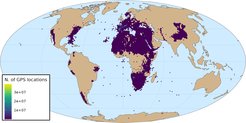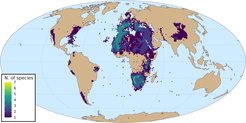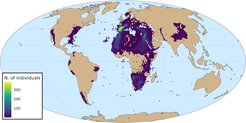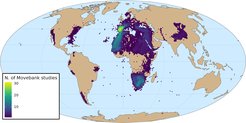
Drylands Project and Vulture Research Consortium
With these two initiatives we aim at bringing together the global community of vulture researchers, creating the “Vulture Research Consortium (VRC)”, practically a simple mailing list where all members can suggest collaborative projects related to vulture movement, to facilitate future research and conservation efforts on these species. Using the VRC as a central place to reach out to the community, we also would like to introduce a first call for a collaborative research project led by the MPI-AB, the “Drylands Project”, aimed at bringing together a large amount of tracking data of various vulture species to understand how water availability affects their movement patterns, globally.
Participation in either of these initiatives (or both) is completely independent. Below you will find more details on the two initiatives.
Vulture Research Consortium (VRC)
Background
We would like to bring together the global community of vulture researchers to facilitate future collaborative research and conservation efforts on vultures. This will be done mainly and at this moment by creating a mailing list of people active in vulture research globally. Its purpose is to build a central place to suggest collaborative projects and submit calls for participation. Participation in the VRC mailing list is completely independent from any commitment to join any specific project. Any member of the VRC mailing list can use it to share information and/or ask other members to share their data or expertise for future collaborative projects regarding vultures. You can think of the VRC as a market place for vulture researchers to initiate and engage in collaborative research activities. We will initially formalize the procedure of how calls to the VRC should be structured. We also invite anyone wanting to support us in organizing and running VRC to step forward as we welcome all the support we can get. Later and depending on the reception of this call in the community, we can foresee expanding this initiative involving parties interested in building on this initial information and communication channel.
How to join the VRC
This initiative only requires providing your email address, which will be shared with the other members of the mailing list. If you are interested in joining the VRC mailing list, please sign up at the link https://listserv.gwdg.de/mailman/listinfo/VRC, or simply by sending an email to vrc-join@ab.mpg.de.
Drylands Project
Background
We would like to reach out to the future members of the Vulture Research Consortium (VRC) to suggest a first collaborative research project. The Drylands project aims at bringing together a large amount of tracking data of multiple vultures species, at global scale, to study the relationships between vulture communities and drylands. In particular we are interested in how vulture movement patterns are affected by and change with different dryland indicators, such as change in water availability and other biotic and abiotic desertification-associated processes.
Large scavenging birds inhabit a wide range of areas with varying degree of dryness. Their need for atmospheric subsidies (uplifts) for their efficient soaring flight ties them to specific “energy landscapes”: areas in the landscape which provide these uplifts, owing to specific combinations of land-use and cover, water availability, topography and local atmospheric conditions such as wind and temperature. As scavengers, vultures occupy the top of the trophic pyramid and are prime candidates to show and observe changes in ecological and environmental dynamics. We thus plan to investigate, in addition to the movement characteristics, how the species composition and distribution can be tied to dryland-specific environmental factors.
By bringing together a large amount of tracking data of various species, covering the largest possible temporal and spatial scale, we also aim at finding gaps in spatial knowledge, i.e. areas where we know vulture populations exist but where currently we lack tracking data. This will help to inform future foci in bio-logging efforts for large scavenging birds.
The purpose of this project is to write scientific papers for peer reviewed journals and we offer to all participants/data owners the opportunity to contribute to, and co-author, these publications (see data sharing agreement).
This collaborative project, led by the MPI-AB, would require the MPI-AB and each of the prospected participant/data owner to sign a “scientific cooperation and data sharing agreement”. This agreement is for owners of vulture tracking data exclusively for collaborating through contributing their data to the Drylands project. Additional information about the project and the text of the data sharing agreement can be downloaded at the end of this page.
However, for organizational and logistical reasons, the actual signing of the agreement will only be possible via a survey that each participant is kindly asked to fill out (see below).
How to join the Drylands project
Here you can find our invitation to the online survey with explanation and specification for participating in, and contributing to, the Drylands Project.
https://survey.academiccloud.de/index.php/744794
Please feel free to explore and read the survey, complete it where only at the very end you will be asked to decide whether or not you want to join and contribute your data to the Drylands Project. In the case that you should agree to the collaboration conditions, the completed survey would serve as an official "Scientific Cooperation & Data Sharing Agreement" for the Drylands Project. If for documentation and legal reasons you (the data provider) require a copy of the agreement signed by the project leads (data user), we are happy to provide it after receiving a completed online survey.
This initiative would require your tracking data to be on Movebank. If your data is not yet on movebank.org, but you would like to join the project, you can follow the instructions provided in the survey to upload your data on the Movebank platform.
A list of the participating members (PI name and institution) will be published and updated (as members join) on this website.
Please contact Dr. Martina Scacco (mscacco@ab.mpg.de) and Dr. Anne Scharf (ascharf@ab.mpg.de) with any questions you may have.
Download the project description and the data sharing agreement
Map of contributed data (last update: 08.01.2025)




List of PIs contributing data to the Drylands Project (last update: 08.01.2025)
| PI | Affiliation |
|---|---|
| Arkumarev, Volen | Bulgarian Society for the Protection of Birds, Bulgaria |
| Bonisoli Alquati, Andrea | California State Polytechnic University, USA |
| Buechley, Evan R | The Peregrine Fund, USA |
| Carbonell Alanís, Isidoro | Saloro, Spain |
| Cerri, Jacopo | University of Sassari, Italy |
| Cipollone, Mario | Rewilding Apennines ETS, Italy |
| Curk, Teja | Leibniz Institute for Zoo and Wildlife Research, Germany |
| de la Riva, Manuel | Estación Biologica de Doñana, Spain |
| Dobrev, Dobromir | Bulgarian Society for the Protection of Birds, Bulgaria |
| Duriez, Olivier | CEFE, University Montpellier, France |
| Efrat, Ron | Ben-Gurion University of the Negev, Israel |
| Evans, Betsy | USDA-APHIS-WS-NWRC-Florida Field Station, USA |
| Fernández-García, José M. | Hazi Foundation, Spain |
| Fiedler, Wolfgang | Max Planck Institute of Animal Behavior, Germany |
| Galán, Manuel | GREFA (Grupo de Rehabilitación de la Fauna Autóctona y su Hábitat), Spain |
| Gil, Juan Antonio | Fundación para la Conservación del Quebrantahuesos, Spain |
| Guido, Jorgelina María | INIBIOMA (Universidad Nacional del Comahue – CONICET), Argentina |
| Guilherme, João L | Vulture Conservation Foundation (VCF), Zurich, Switzerland |
| Iglesias-Lebrija, Juan José | GREFA (Grupo de Rehabilitación de la Fauna Autóctona y su Hábitat), Spain |
| Kendall, Corinne | North Carolina Zoo, USA |
| Kolberg, Holger | Ministry of Environment and Tourism, Namibia |
| López-López, Pascual | University of Valencia, Spain |
| Margalida, Antoni | Pyrenean Institute of Ecology (CSIC), Spain |
| Mateo-Tomás, Patricia | Biodiversity Research Institute (University of Oviedo - CSIC - Principado de Asturias), Spain |
| Oppel, Steffen | RSPB Centre for Conservation Science, UK |
| Pérez García, Juan Manuel | University Miguel Hernandez of Elche, Spain |
| Peshev, Hristo | Fund for Wild Flora and Fauna, Bulgaria |
| Posillico, Mario | Reparto Carabinieri Biodiversità Castel di Sangro, Italy |
| Saenz, Fausto | Fundacion Neotropical, Colombia |
| Safi, Kamran | Max Planck Institute of Animal Behavior, Germany |
| Sánchez, Angel | Junta de Extremadura, Spain |
| Shepard, Emily | Swansea University, UK |
| Sherub, Sherub | Ugyen Wangchuck Institute for Conservation and Environment, Bhutan |
| Spiegel, Orr | Tel Aviv University, Israel |
| Subedi, Tulsi R | Nepalese Ornithological Union; Himalayan Nature, Nepal |
| Valente e Santos, João Pedro | Palombar - Associação de Conservação da Natureza e do Património Rural, Portugal |
| Vargas, F. Hernan | The Peregrine Fund, USA |
| Voeroes Dénes, Francisco | University of São Paulo, Brasil |
| Wikelski, Martin | Max Planck Institute of Animal Behavior, Germany |
| Wolter, Kerri | VulPro, South Africa |



